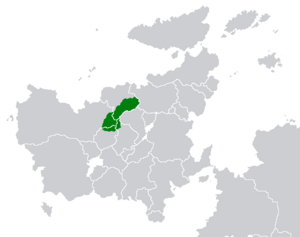Kriklivets Social Republic
This article is incomplete because it is pending further input from participants, or it is a work-in-progress by one author. Please comment on this article's talk page to share your input, comments and questions. Note: To contribute to this article, you may need to seek help from the author(s) of this page. |
Kriklivets Social Republic | |||||||||
|---|---|---|---|---|---|---|---|---|---|
| 1928–1934 | |||||||||
| Motto: Пролетарі всіх країн, єднайтеся! (Narodyn) "Workers of the world, unite!" | |||||||||
| Anthem: The Internationale | |||||||||
 The KSR at its territorial height after the Battle of the Tsyr in 1929, superimposed on modern borders | |||||||||
| Status | Partially-recognised state | ||||||||
| Capital | Velike Vishnavaya (1928–31) Sommarö (1931–34) | ||||||||
| Common languages | Narodyn Seniak Vichod | ||||||||
| Demonym(s) | Kriklavian | ||||||||
| Government | Unitary council communist republic | ||||||||
| Premier | |||||||||
• 1928–1934 | Alexej Batsov | ||||||||
| Legislature | Peoples' Congressa | ||||||||
| History | |||||||||
• Established | 7 March 1928 | ||||||||
| 8 November 1929 | |||||||||
| 26 June 1934 | |||||||||
| 7 July 1934 | |||||||||
| Area | |||||||||
| 1929 | 224,161 km2 (86,549 sq mi) | ||||||||
| Population | |||||||||
• 1929 | 9,781,263 | ||||||||
| |||||||||
| Today part of | |||||||||
| |||||||||
The Kriklivets Social Republic (Narodyn: Криклівець Соціальна Республіка; Kryklivetsʹ Sotsialʹna Respublika, Vichod: Kurikimaan sosiaalinen tasavalta, Seniak: Sociálna republika Krikima), often abbreviated to KCP or KSR was a partially-recognised state that existed in central Euclea from 1928 to 1934. It was an indirect combatant in the Great War and was founded by the Voyins movement. Supported and recognised exclusively by Swetania and its close socialist allies, the state was largely supported by Swetania until its entry into the Great War made logistical support unfeasible, and was mostly pulled by 1932. It subsequently fought against Narozalica but was absorbed back into the country in 1934 at the Battle of Koskov.
The first established socialist state in Western Euclea, the KSR mainly adhered to Swetania's established iteration of socialism, with plans to employ policies of council communism and market socialism throughout the KSR after the war. As no internal state-like elements were ever established in the KSR, political experts have designated it as de facto anarchist in nature – making it one of the first states of its kind. However, Alexej Batsov, Premier of the KSR from 1928 to 1934, openly disavowed anarchism and professed desire to establish a state "on common grounds with Swetania". Due to the war, a permanent state-of-emergency existed in the KSR throughout its existence. The KSR was characterised by widespread guerrilla warfare as well as rampant militarisation ordered by Batsov and his contemporary Saku Litmanen, primarily to defend from Narozalica attempting to reclaim its land.
Name
History
Politics and government
Administrative divisions
Economy
Recognition
Few states ever recognised the Kriklivets Social Republic as a sovereign nation-state, and official recognition was severely limited to select states, mainly socialist states and allies of Swetania
 Chistovodia, officially recognised from 1928 to 1934
Chistovodia, officially recognised from 1928 to 1934Dezevau, officially recognised 1934
Swetania, officially recognised from 1928 to 1934
